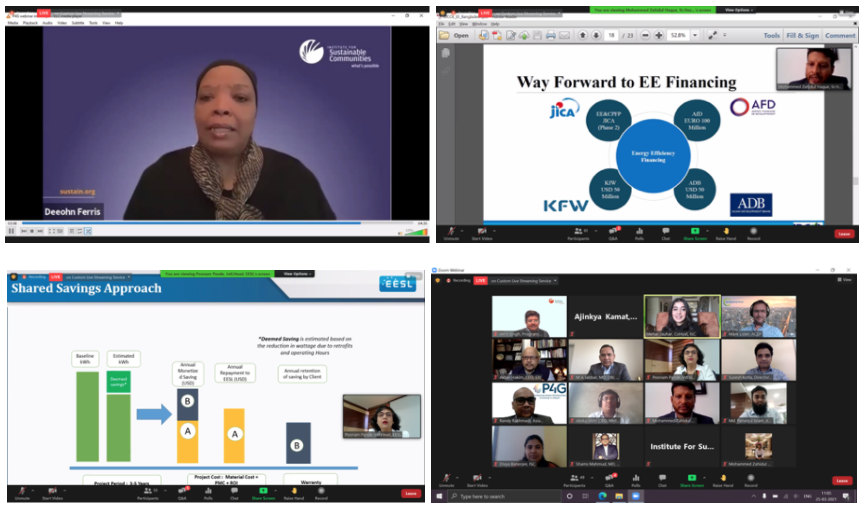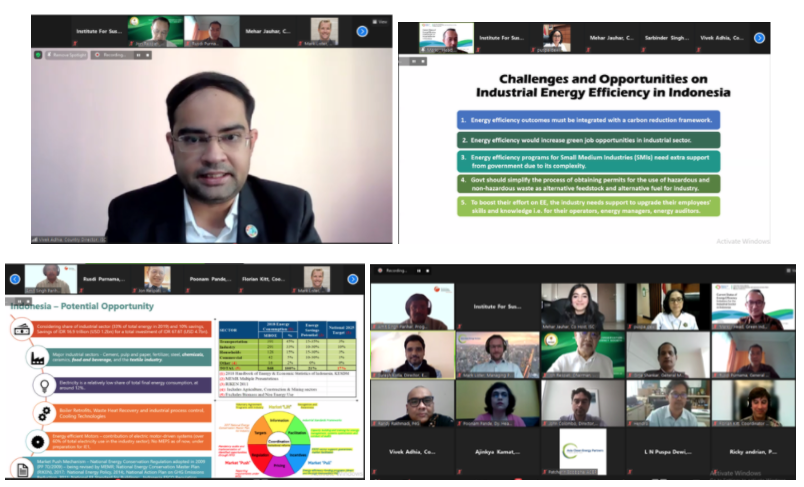Paving the Way Forward for Industrial Energy Efficiency in Bangladesh & Indonesia: A Stakeholder Conference
To further delve deep into the findings of report – Industrial Energy Efficiency Opportunities Assessment in Asia, ISC convened stakeholder conferences in Bangladesh and Indonesia (with the one in Vietnam upcoming) which brought together key players in industrial energy efficiency ecosystem to examine the challenges, potential solutions and partnerships required to accelerate take-up of industrial energy efficiency in the respective countries as well as the region. The events helped bring forward the perspectives of relevant stakeholders in the energy ecosystem, and successfully derived solutions and innovative, deployable business models to accelerate the adoption of EE and clean energy measures in the countries. The conferences witnessed participation from a veritable set of highly experienced and leading speakers and audience representing the various domains of industry, government, finance, the energy sector, technology vendors, international organisations and key institutions implementing energy efficiency within Bangladesh, Indonesia and the region. The events ensured the widespread regional dissemination of the innovative demand aggregation ESCO based “E2 Alliance Model”, currently being implemented in India by ISC and EESL, thereby creating windows of opportunity for building effective collaborations with stakeholders in the respective countries in order to replicate the model, implement the integrated unique financing solutions and explore prospects for B2B market based approaches.
Bangladesh
“Energy efficiency is the counterpoint that presents the opportunity to reduce energy demand by 15-30 per cent thereby unlocking cost effective energy access opportunities for all…..of all possible approaches to climate action, energy efficiency offers the greatest promise, since it significantly reduces energy consumption while reducing energy costs and providing an attractive financial return”, said Deeohn Ferris, President, Institute for Sustainable Communities (ISC) at the virtual stakeholder conference convened by ISC in Bangladesh on 25rd March 2021. The event was co-convened with Bangladesh’s Engineering Resources International (ERI) as well as Asia Clean Energy Partners (ACEP). The following stakeholders attended the meeting as speakers – Sustainable & Renewable Energy Development Authority (SREDA), Infrastructure Development Finance Company Limited (IDCOL), DBL Group, Shasha Denim Ltd, Wellmake Engineering and Technology, Partnering for Green Growth and the Global Goals 2030 (P4G) and Energy Efficiency Services Limited (EESL). Over 60 industry participants joined as an interactive audience for the event.

Indonesia
“Perhaps energy efficiency can prove to be the vaccine that spurs industrial recovery and manufacturing growth”, said Vivek Adhia, Country Director India, Institute for Sustainable Communities (ISC) at the virtual stakeholder conference convened by ISC in Indonesia on 03rd March 2021. The event was co-convened with Indonesia’s Energy Conservation and Efficiency Society (MASKEEI) as well as Asia Clean Energy Partners (ACEP). The following stakeholders attended the meeting as speakers – Ministry of Energy and Mineral Resources (MEMR), Ministry of Industry (MoI), Indonesia Energy Conservation and Efficiency Society (MASKEEI), Asian Development Bank (ADB), Clime Capital, Danfoss Indonesia, PT INDESCO, Partnering for Green Growth and the Global Goals 2030 (P4G) and Energy Efficiency Services Limited (EESL). Over 70 industry participants also joined as an interactive audience for the event.

Virtual Consultation on Accelerating Adoption of Industrial Energy Efficiency through Innovative Business Models
Energy Efficiency Services Limited (EESL), supported by the Ministry of Power, Govt. of India, is one of the largest super ESCOs in the world and has successfully demonstrated the implementation of Energy Efficient (EE) technology at scale through its various national-level initiatives using the innovative concept of Demand Aggregation and ESCO Financing. ISC has been an active partner to EESL and has supported the National Motor Replacement program (NMRP) since its inception. While promoting the E2 Alliance Model as part of the program accelerated by P4G, ISC and EESL are jointly working together to advance NMRP work in India with an intent to accelerate the adoption of energy-efficient technologies by working with different ESCO and financing institutions. In this regard, ISC along with EESL organised a consultation workshop on “Accelerating Adoption of Industrial Energy Efficiency through Innovative Business Models” building the capacity of over 40+ participants from diverse industrial sectors and ESCOs in India. The objective of the consultation was to upscale the energy efficiency projects by leveraging the network of ESCOs and Private Financing Institutes through market based business models that can be replicated and benefited to the MSME sector in India. The workshop ensured a constructive and insightful discussion on the present windows of opportunity available to recalibrate development strategies and design national-level frameworks, financing mechanisms as well as market-based innovative models that can help fast track adoption of industrial energy efficiency while shedding light on how ESCOs can be innovatively integrated with the GEF 5 project to upscale the energy efficiency measures in country. The consultation also highlighted the alternative models that can transform the energy efficiency scenario for SMEs in the country. The event was successful in effectively reaching out to the key stakeholders within the energy ecosystem in India, building their knowledge capacity and combating the challenges of limited technical awareness within industry participants, financial stakeholders and ESCO members.

Cementing Sustainable Collaborations with Government Institutions: Signing of Memorandum of Understanding with Maharashtra Pollution Control Board
Memorandum of understanding (MoU) was signed between Maharashtra Pollution Control Board and the Institute of Sustainable Communities (ISC) which is an important step in effective implementation of the Clean Air Accelerator program. This five-year alliance between the two parties formalises the collaboration towards finding a solution for cleaner production, air pollution management, water pollution management, environmental health and safety and climate change. The major suggested programs on which both the parties will work (and not limited to) are Urban-Industry-Nexus which would include creating awareness among the common public, increasing technical assistance to stakeholders, developing tools as a part of air pollution mitigation strategies, training and capacity building of the stakeholders, market assessment on the newer available technologies for cleaner air their and adaptation strategies, scaling up the intervention strategies as well as disseminating them. The final goal of the organisations would also include participation in working on Climate Change Mitigation, Water Pollution Management, Communication, Awareness, Outreach and Public Relations.
